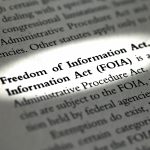Everybody Out of the Pool: Recognizing a First Amendment Claim for the Retaliatory Closure of (Real or Virtual) Public Forums
Legal, Policy and First Amendment
America has a rich history of peaceful protests and demonstrations on public property to exercise their First Amendment right of freedom of speech, regardless of how vitriolic or partisan that rhetoric may be. But University of Florida College of Journalism and Communications Journalism Professor Frank LoMonte, director of the Brechner Center for Freedom of Information, believes that the Supreme Court will soon have to weigh in on the constitutionality of the issue because of more advanced communication tools.
LoMonte cites two recent federal appellate court decisions, one in the Fourth Circuit U.S. Court of Appeals and the other in the Ninth Circuit, that make it more unclear whether government agencies can prevent demonstrators from having access to public property.
The primary legal determinant is called the “forum doctrine,” which claims that while all government property belongs to the public both physically and metaphysically, not all government property is equally suitable for expressive use. According to LoMonte, these forums are too easily closed when the speech presented is unfavorable. He proposes that a speaker who is denied access to public property for expression because the government attempts to revoke the “forum” status of the property to keep the speaker from being heard, must have a First Amendment claim.
In the first case, the Fourth Circuit tackled the display of banners on lampposts in Lexington, Virginia. The banners were the Sons of Confederate Veterans’ Confederate flag in anticipation of a parade they were hosting; other private organizations were also permitted to hang banners from the same lampposts from 1994 until 2011. The Court categorized the city-owned lampposts as a designated public forum but found no First Amendment violation in the city’s decision to rescind public access altogether starting with the flags. Essentially, closing the forum was acceptable despite freedom of speech.
Meanwhile, the Ninth Circuit case involved a student-produced magazine at UC-San Diego specializing in tasteless humor fighting to regain eligibility for public funding. The University denied the magazine’s eligibility to compete for student activity fees forcing it to discontinue printing. In this scenario, according the court, the denying funding effectively closed the forum and violated the newspaper’s freedom of speech.
This forum nature of public spheres also extends to social media networks. Social media users who were blocked from reading or posting comments to pages maintained by government officials have largely (but not always) prevailed when challenging the withdrawal of access in court. In this vein, LoMonte feels that decision-makers need to have clear judicial guidance about when a public official or governmental social media page may be deactivated entirely.
As LoMonte explains, a public forum needs clear legal delineation and its status as open or closed evident prior to a potential infringement of First Amendment rights because of disagreement of message or as a retaliatory act.
The original article, “Everybody Out of the Pool: Recognizing a First Amendment Claim for the Retaliatory Closure of (Real or Virtual) Public Forums,” was published in the University of Florida Journal of Law and Public Policy, Volume 30.
This summary was written by Dana Hackley, Ph.D.
Posted: February 2, 2021
Insights Categories:
Legal, Policy and First Amendment
Tagged as: Censorship, First Amendment, Frank LoMonte


